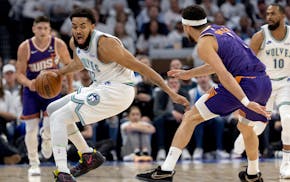Jon Marthaler bakes up a delicious batch of links for you every weekend. Other times, you can find him here. Jon?
---------
Every morning I read the sports section of the Newspaper of the Twin Cities. One of the great features of the paper in the winter is the league roundups for the NBA and NHL - just a short sentence or two to describe what happened in each game, like SportsCenter via text message (and with no talking heads.) The NHL roundup, of course, only returned when the league did, and in the short time since I've noticed something: the NHL is almost impossible to follow.
In other sports, it's fairly easy to keep tabs on how the previous night's results affected the storyline of the season. There are five, maybe six, teams in either conference that have a chance of being competitive, and about five in the whole league that have a real shot at the NBA title. It's pretty easy to scan the NBA roundup and say, "Hey, Memphis was looking good, but they sure got slaughtered by Oklahoma City last night." It's easy to understand, and that's especially true because on a night-to-night basis, the best team usually wins.
In contrast, in the NHL, nothing ever makes sense. Night-to-night, anything can happen - a hot goaltender, a penalty-happy referee, a couple of pucks that just wouldn't settle. Consequently, there's no real separation to speak of. In 2010-2011 - the last time both sports played a full season - there were nine NBA teams that won at least 50 games, while only one NHL team managed that number, even with a few "free" shootout wins thrown in. The NHL's second-best team won 48 games that year; in the same year, 48 wins was, just barely, good enough for the seventh playoff seed in the NBA's Western Conference.
Parity's something that most fans like, I think; it's good for the game of hockey that the league isn't dominated by its few rich markets, especially since the poorer markets can't even hardly keep up under the current system. But there's no denying that the NHL's hard to keep tabs on, even for the most dedicated viewers. I think that's part of the reason that the league's national profile - especially on a network like ESPN, which is not known for its willingness to go in-depth - tends to be so low.
*On with the links:
*Parker Hageman breaks down Miguel Sano at TwinsCentric, focusing on some mechanical changes that Sano has made over the past several minor-league seasons. Given the Twins' seeming focus on the future - Aaron Hicks now, Sano later - this may be the closest thing we have to excitement for awhile.
*With the Harbaughs the talk of the Super Bowl, Ken Dryden writes at Grantland about playing in goal in the NHL, with his brother Dave in the opposing goal, and how he couldn't mentally prepare any time he played against his brother.
*Here's the story of ten guys who have been locked in a game of tag for 23 years. The real question: how is this not televised?
*The Los Angeles Dodgers signed a TV deal with Time Warner that will result in the creation of an entirely new sports channel in L.A. The deal is worth $8 billion over the next 25 years - $8 BILLION - and reminds us of two things: first, the Twins were ten years too early with Victory Sports. Second, the best thing that could happen for the Twins' payroll is for TWC or Comcast or somebody else to start up a competing regional sports network in Minneapolis to compete with Fox Sports North, thus driving up the price for the Twins' TV rights.
*And finally: watch here as a huge Tayshaun Prince fan finds out that his favorite player has been traded and then gives up on the Pistons - all captured on camera in the arena.
Bobrovsky makes incredible save during Panthers-Lightning playoff game
De La Cruz powers Reds to 8-1 win to end Phillies' 7-game streak

